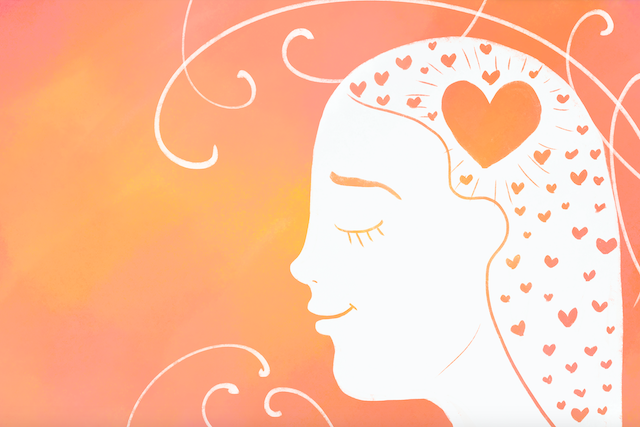
“The better you feel about yourself, the less you feel the need to show off.” ~Robert Hand
The first vivid memory I have of anxiety is when I was only seven years old. I sat in math class, gripped with fear that I wouldn’t get a perfect score on my test. If I got even one answer wrong, I would feel worthless.
This striving for achievement followed me all the way through college. I not only graduated with a 4.0 grade point average, but I had an impressive Curriculum Vitae filled with awards, extra curricular activities, publications, honor societies, and more. Each time I added something to my list of achievements, I felt a surge of worthiness.
Yet, this satisfaction with myself didn’t last long. Soon, I was on to the next task to prove to myself (and others) that I am worthy.
I fell into the same trap in graduate school: commuting each night, taking extra classes, making all A’s, working a part-time job—until the panic attacks hit. I couldn’t control my brewing anxiety anymore, and I developed debilitating panic disorder and agoraphobia. I could barely function, so I made the decision to drop out of my graduate courses.
I believe the panic attacks were my body’s and mind’s way of screaming out for help. Their way of saying, “I’ll make you stop since you won’t listen,” of letting me know that perfection isn’t healthy or possible.
During those anxiety-ridden days, the panic made it impossible for me to live a successful life according to my previous definitions. Suddenly, my biggest accomplishment was simply making it through the day or going to the grocery store alone. I felt antsy and worthless without academics or a steady job.
I was forced to redefine my ideas of self-worth. I realized that chasing my worth based on one accomplishment after another was making me miserable.
I had to learn that my worth runs so much deeper than what I can prove through achievement. I had to learn that I am worthy simply because I exist, and nothing more.
Here are four ways that I have started overcoming the need to base my worth on accomplishments.
1. Make a list of all the things you love about yourself that have nothing to do with achievement.
This may sound silly or trivial, but making a list of the things you adore about yourself is actually a lot harder than you’d think. The first time I sat down to write this list, nothing came to mind that wasn’t linked to my accomplishments.
Slowly, I opened up to the fact that I love how genuinely good-hearted I am. I’m compassionate and sensitive, and I love that about myself. I love that I’m a good listener. I love that I’m soft-spoken and not confrontational. From there, the list just kept flowing.
If you have a difficult time with this, it can be helpful to ask your loved ones to write a list of all the things they love about you. This can be a wonderful way to remind you that you are more than what you do.
2. Redefine your idea of success.
Recently, I felt twinges of worthlessness as I perused social media and found that my peers were accomplishing seemingly great things in their high-paying, full-time jobs. They looked successful, and I felt very unsuccessful teaching my low-paying yoga classes and publishing my writing for free.
But then I stopped and asked myself what a successful life would look like to me. For me, a successful life would be spending the day doing things I love. It would be having loving relationships that teach me and help me grow. It would be making a positive impact, however small, with my work. Success doesn’t have to mean money or recognizable accomplishment.
After I defined what success looks like to me, I realized I’m already living that life. I spend my days teaching yoga and writing, the two things I absolutely love to do. I have beautiful relationships. I’m making a positive impact with my teaching and my words.
As I was busy chasing some unattainable dream of success, I didn’t realize I had it all along.
When you find yourself gripped with unworthiness, ask yourself what success would look like to you, and you alone. Are there ways in which you’re already living a successful life, based on your own definition? The answers might surprise you.
3. Meditate on the part of you that never changes.
When I was going through my yoga teacher training, I came across this idea in Nicolai Bachman’s The Path of the Yoga Sutras, and my heart skipped a beat. Meditate on the part of you that never changes.
This meant the part of me that stayed the same whether I got a good grade, or I failed a test. The part of me that will stay the same whether I win an award, or I’m housebound with agoraphobia.
As I meditated on this idea, I came to realize that the part of me that never changes is pure love. There is a space of infinite love, peace, and understanding that has been with me all along.
Chasing validation of my worth through outside, visible accomplishments had only served to take me further away from the fact that I am love. Achievements don’t change, and never will change, who I am at my core.
4. Practice unconditional self-love.
A light bulb went off in my head while I was playing with my dog recently. I love that little rascal inside and out, and he doesn’t have to do a single thing to deserve it or be worthy of my love.
It’s the same with babies. Babies don’t try to prove themselves to you. They don’t have to accomplish something in order for you to love them. You love them unconditionally simply because they exist.
What if you didn’t have to do anything or prove anything to be worthy of your own love? What if you deserved your own unconditional love, just like you give to your pets or to your children?
Practice extending unconditional love to yourself by forgiving yourself when you’re not perfect, and recognizing that you deserve love no matter what you achieve.
Letting go of perfectionism and the need to base our worth on external validation is a continual process. But, with time, we can begin to shed our layers of conditioning that taught us we are not worthy, and see ourselves for the beautifully deserving beings we are.
About Malia Bradshaw
Malia Bradshaw is a yoga teacher, writer, and mental health advocate. You can find more of her work, including her life-changing Meditation Program for Anxiety, blog, e-books, yoga videos, and more at maliayoga.com. To connect, follow her on Instagram @yogaforanxiety.













 Though I run this site, it is not mine. It's ours. It's not about me. It's about us. Your stories and your wisdom are just as meaningful as mine.
Though I run this site, it is not mine. It's ours. It's not about me. It's about us. Your stories and your wisdom are just as meaningful as mine.
Great article, Malia. Thanks.
Thank you for sharing your story and your wisdom, Malia. I struggle with “achievement” as well. I am trying to find my place in the world, and lately I have been feeling so guilty, even worthless, that I don’t have it “figured out.” I have long struggled with perfectionism, and reading this was just the reminder that I needed that I don’t need a pile of achievements or a “perfect life” to walk my own unique path to happiness.
Molly, you sound just like me! Perfectionism can be so difficult to deal with. Don’t worry about not having it all figured out, I don’t think any of us do!! I know I definitely don’t. As you said, walk your own unique path to happiness. Such a beautiful way to put it. Wishing you all the best!
Thanks Malia. Beautifully expressed. This was similar to my previous way of life (perfectionism and anxiety) until I escaped it some years ago now.
I was literally just telling a friend that I am so much happier now that I don’t approach my days with an attitude of how much can I get done and how can I be most efficient. Now I approach it by thinking how can I enjoy myself the most.
It can be challenging not to take notice of the ‘shoulds’ of society and to not compare my new working life (coaching, workshops and yoga) to my previous high paying career, but I would not it change it for anything!
It took me 17 years to have the courage to ditch the ‘shoulds’ and follow my dreams. (My body was also giving me signs!) In a way, although I wouldn’t want anyone to experience panic attacks and I don’t say this lightly, you have your body to thank for letting you know that you weren’t being true to yourself and that you would be happier on another path.
Thanks for taking the time to share your experience with others 😊🙏
“thinking how can I enjoy myself the most.” That is such a beautiful way of looking at it. I’m so glad you’ve been able to escape the clutches of anxiety and perfectionism. I definitely agree with you about being grateful for my body’s signs. I can always count on it to show me when I’m forcing myself down the wrong path!
That is a very well though out article and an amazing realization you have come to. I think this is something we all struggle with maybe because we are too influenced by what society tells us is the “right path” to follow and that our self worth has to be linked to our job/career titles and how much money we make. As for social media people will only post the good things they will show you their success but they will never post the other side of that such as stress, burnout and anxiety.
Exactly! I’ve made it a point to start posting more about the “real” stuff on social media, or catching myself when I try to use too many photo filters or try to romanticize my life. It’s a process! Our society definitely plays a big role in how we view ourselves.
Much appreciated, thanks for sharing.
My pleasure, thanks for reading!!
Thank you. I really needed to read this. Turns out i’m not doing so bad after all 🙂
Exactly! In fact I bet you’re just doing wonderfully at life 🙂
This is a hard subject to grapple with. It’s a wonderful article … but even when I read uplifting articles like this, I catch myself thinking “yeah, but she’s is an accomplished writer”. Is it truly possible to sit with ourselves and be happy with who we are if we are not having an impact on our world in some obvious, tangible, measurable to way? Such a conundrum.
Thanks Malia, I wish your words continuously flowed through my mind every hour…it gets tough when you are changing pay offs for being co-dependant…
Thank you so much! I needed to hear this. I wrote in my journal as I read to implement the ideas right away. Hugs!
Please help me understand something, because I really want to get this, but still I really
struggle with self love in practice.
1. Make a list of all the things you love about yourself that have nothing to do with achievement.
Why? These are still conditions for love. I am not consistently compassionate, a good listener, generous, etc. In fact, every day I have mean or grumpy or aggressive feelings
towards others, I don’t feel like smiling back to ‘nice’ people and I am selfish and critical.
I don’t want to be like that, but I am. The more I strive to be the opposite the more I loath myself because I can’t seem to change these things about myself. In the meantime, I am also rejecting myself for being imperfect.
Similarly, your point 3. Meditate on the part of you that never changes… I am love, is not something I can honestly say for myself. Yes I have felt very strong sense at times that I am pure love. But I am many more horrible things than love. I feel violent and jealous and revengeful. All these things are not love.
People like to use babies as examples of always deserving of unconditional love. I get this
intellectually. But in practice most babies are not treated with unconditional love, and they are instructed on how to behave (keep quiet, be kind, etc) to avoid harsh reactions, and many times (as was my story) they are abused and beaten.
It seems that you only love ‘love’. How is this not conditional…Can you please explain?
And in real life practice… what can you hang on to to grow love? There is no part of me that never changes that I can love and build up.
Very good points, that I struggle with as well.
you and your article are amazing help me a lot
really you are making a difference